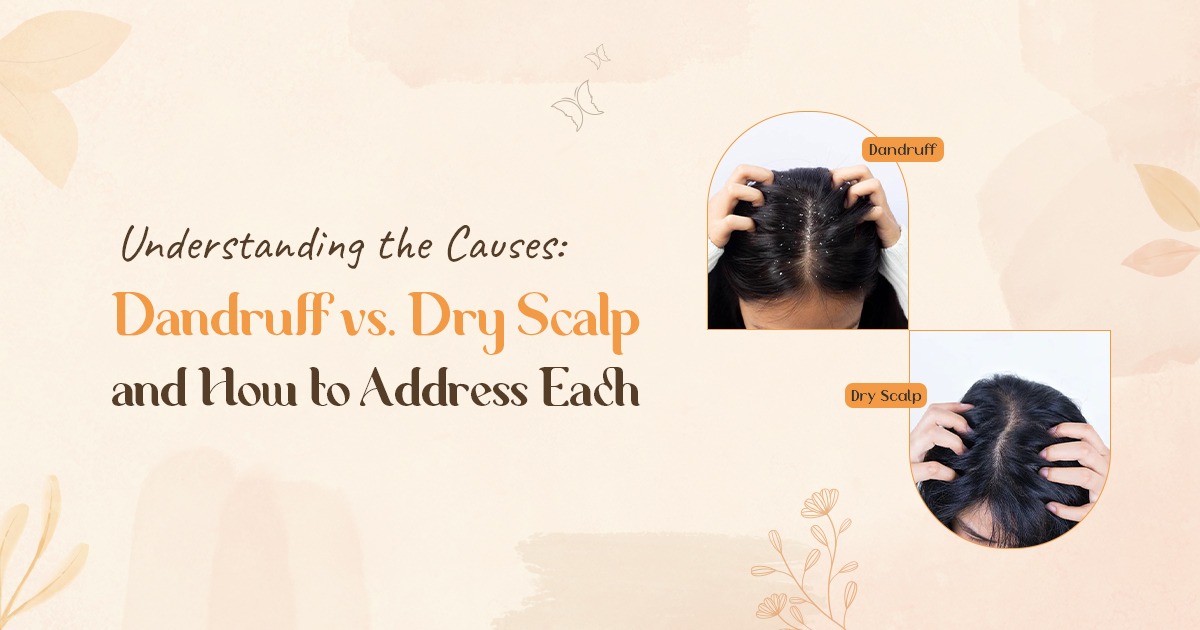
Flaky scalps are a common nuisance that many people struggle with, often leading to confusion between dandruff and dry scalp. Understanding the difference between these two conditions is crucial for effective treatment and management. Without proper knowledge, individuals may resort to ineffective remedies, prolonging their discomfort. In this blog, we'll delve into the causes of dandruff and dry scalp, dispel common myths and misconceptions, and offer prevention tips.
Dandruff vs. Dry Scalp
What is Dandruff and Dry Scalp
Symptoms of Dandruff
-
Flakes: Dandruff typically presents as large, oily, yellowish or whitish flakes on the scalp and sometimes on the shoulders or clothes.
-
Itching: Itching of the scalp is a common symptom of dandruff. The itching may vary from mild to severe and can be accompanied by irritation.
-
Redness: In some cases, dandruff can cause redness or inflammation on the scalp, especially if scratching occurs frequently.
-
Greasy Scalp: Due to excess oil production, the scalp may appear greasy or oily, contributing to the formation of dandruff flakes.
-
Scalp Odor: Dandruff can sometimes be associated with a noticeable odor, particularly if the condition is left untreated for an extended period.
Symptoms of Dry Scalp
-
Small, White Flakes: Dry scalp tends to produce smaller, white flakes that are loosely attached to the scalp. These flakes may fall off easily with minimal manipulation.
-
Tightness and Dryness: Individuals with dry scalp often experience a sensation of tightness or dryness on the scalp. This discomfort can worsen in dry weather conditions or after using harsh hair products.
-
Scalp Irritation: Dry scalp may cause mild to moderate scalp irritation, which can manifest as itching or a feeling of discomfort.
-
Visible Dryness: The scalp may appear visibly dry, with areas of flakiness or rough texture. In severe cases, the skin on the scalp may even crack or become inflamed.
-
Hair Texture Changes: Dry scalp can sometimes lead to changes in hair texture, such as increased brittleness or dullness.
Common Causes of Dandruff and Dry Scalp
Myths and Facts About Dandruff and Dry Scalp
Myth: Dandruff is caused by poor hygiene.
Myth: Dry scalp is a result of washing hair too frequently.
Myth: Dandruff is contagious.
Myth: Dry scalp is just a temporary condition.
Myth: Dandruff only affects people with oily hair.
Prevention Tips for Dandruff and Dry Scalp
Preventing dandruff and dry scalp involves adopting good scalp hygiene practices and making lifestyle adjustments to minimize triggers that can exacerbate these conditions. Here are some prevention tips for both:
Prevention Tips for Dandruff
-
Regular Hair Washing: Wash your hair regularly with a mild shampoo to remove excess oil, dirt, and dead skin cells from the scalp. However, avoid over-washing, as it can strip the scalp of its natural oils, leading to dryness and potentially worsening dandruff.
-
Scalp Massage: Gently massage your scalp while shampooing to improve blood circulation and promote a healthy scalp environment. Be careful not to scratch vigorously, as this can irritate the scalp and worsen dandruff.
-
Avoid Harsh Hair Products: Use hair care products, including styling gels, mousses, and hair sprays, that are gentle on the scalp and free from harsh chemicals or fragrances that can irritate the skin and exacerbate dandruff.
-
Manage Stress: Stress can weaken the immune system and contribute to dandruff flare-ups. Practice stress management techniques such as meditation, deep breathing exercises, yoga, or regular physical activity to reduce stress levels and promote overall well-being.
Prevention Tips for Dry Scalp
-
Limit Hot Showers: Hot water can strip the scalp of its natural oils and contribute to dryness. Opt for lukewarm water when washing your hair to prevent further dehydration of the scalp.
-
Moisturize Regularly: Use a moisturizing conditioner or scalp treatment to hydrate the scalp and prevent dryness.
-
Protect Your Scalp: Wear a hat or scarf in cold weather to shield your scalp from harsh environmental elements such as cold air and wind, which can exacerbate dryness and flakiness.
-
Stay Hydrated:Drink an adequate amount of water throughout the day to keep your body hydrated, which can help maintain moisture balance in the scalp and prevent dryness.
FAQs
Frequently Asked Questions
Dandruff itself isn't harmful to hair, but the underlying causes, such as fungal overgrowth or skin irritation, can lead to scalp inflammation, itching, and discomfort. In severe cases, persistent scratching may damage hair follicles and lead to hair breakage. Treating dandruff promptly can help maintain scalp health and minimize potential damage to hair.
While dandruff itself doesn't directly cause hair fall, persistent scratching of the scalp due to itching and irritation can weaken hair follicles and lead to hair breakage. Additionally, severe cases of dandruff accompanied by scalp inflammation may contribute to temporary hair shedding. Treating dandruff promptly can help prevent potential hair loss associated with scalp damage.
It's generally not recommended to apply oil directly to the scalp if you have dandruff, as oils can exacerbate the condition by providing a favorable environment for fungal growth. However, you can apply oil to the lengths and ends of your hair to moisturize and condition them, while avoiding the scalp area.
To get rid of dry scalp, it's essential to moisturize and nourish the scalp regularly. Use a gentle, moisturizing shampoo and conditioner formulated for dry scalp which are recommended by dermatologists. Avoid hot water when washing your hair, as it can strip the scalp of its natural oils.
Dry scalp itself typically doesn't cause hair loss. However, severe dryness and scalp irritation may lead to scratching, which can damage hair follicles and contribute to hair breakage. Treating dry scalp promptly with moisturizing products can help maintain scalp health and minimize potential hair loss associated with scalp damage.
Coconut oil has moisturizing and antimicrobial properties that can help hydrate the scalp and reduce dryness. Applying coconut oil to the scalp and gently massaging it in can help nourish the skin and alleviate dry scalp symptoms. However, coconut oil may not be suitable for everyone, especially if you have a sensitivity to coconut or if your scalp tends to become oily easily. It's best to patch-test coconut oil before using it on the scalp and to consult with a dermatologist if you have any concerns.
Conclusion
Distinguishing between dandruff and dry scalp is crucial for effective treatment. Consultation with a dermatologist ensures accurate diagnosis and personalized care. At our clinic, we specialize in treating various scalp conditions with expertise and compassion.
Schedule your personalized hair treatment consultation at Experts Skin and Hair Clinic in Sainikpuri, Secunderabad today! Our expert dermatologists specialize in addressing scalp issues with precision and care. Don't let dandruff or dry scalp hold you back. Contact us now to start your journey towards a healthier, flake-free scalp. Your confidence begins with healthy hair.


